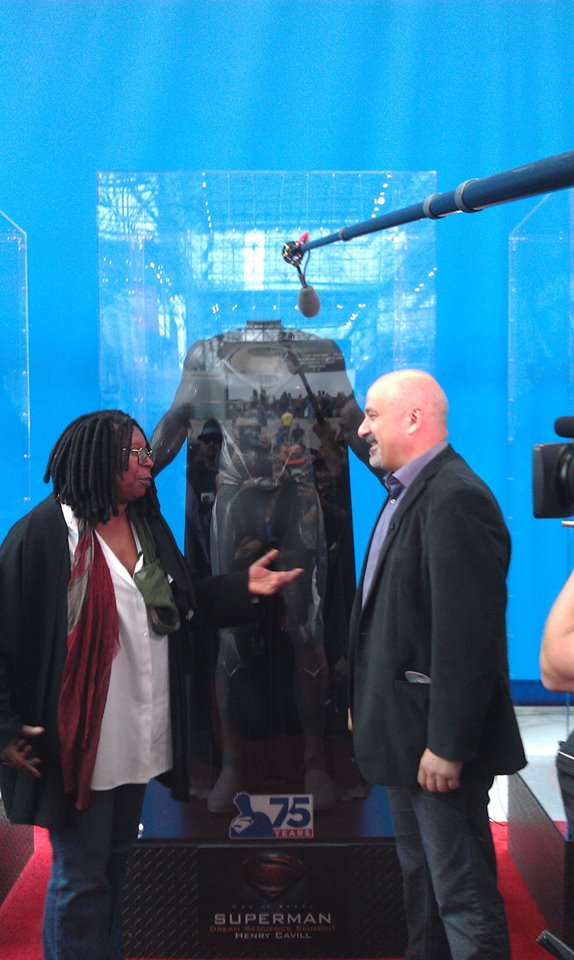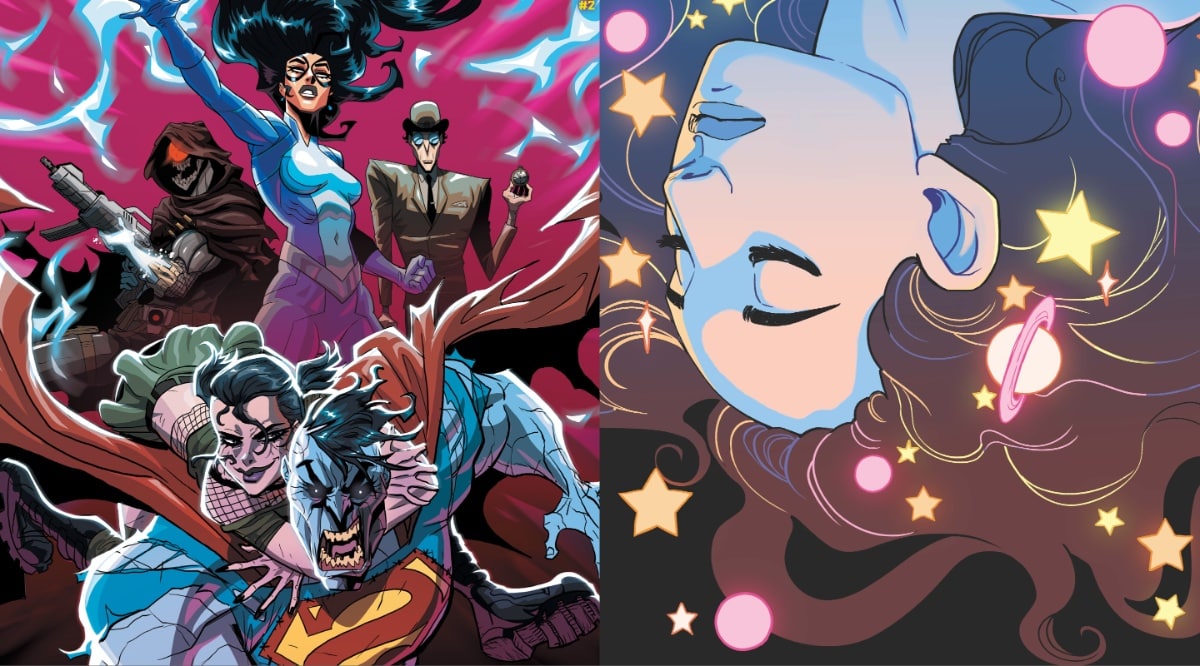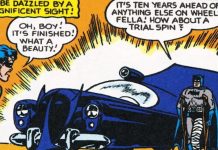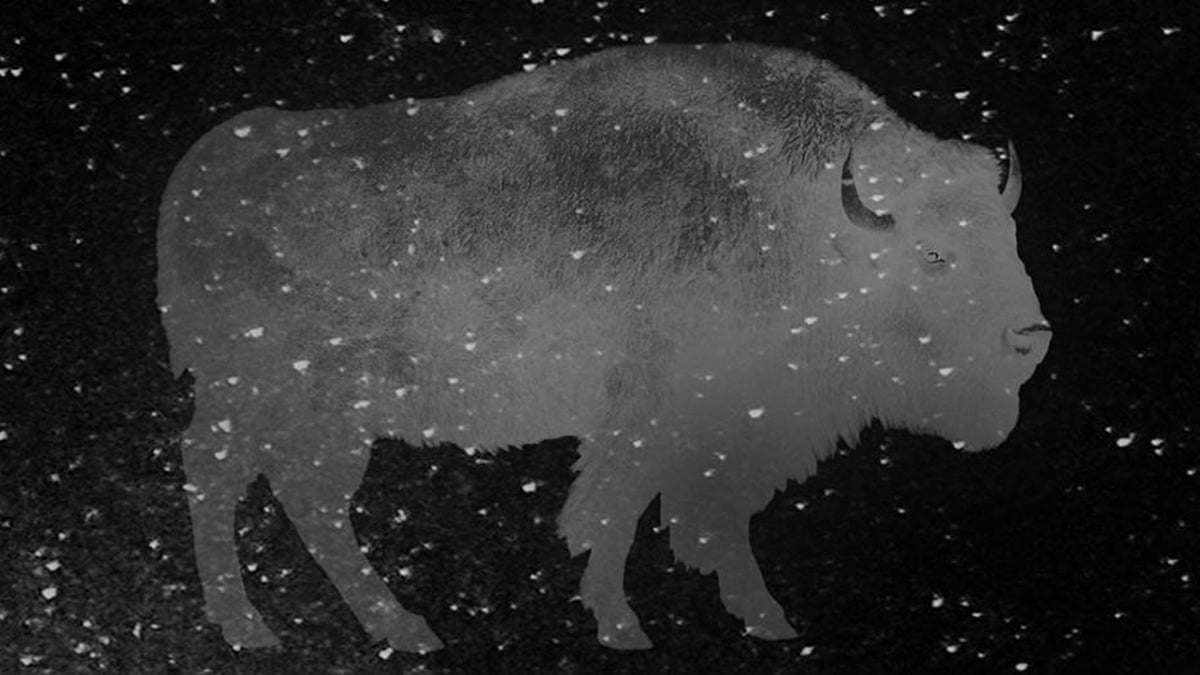Say what you will about Dan DiDio: in his time as DC’s first executive editor then co-publisher, he’s remade a lot of what made the company tick, starting with Identity Crisis, the controversial but best selling mini series that kicked off what we at Stately beat Manor call The Crisis Era. (Infinite Crisis and the misleadingly named Final Crisis would follow). As DC’s spring move to the west coast closes the cover on more than 75 years of comics history, DiDio is revisiting his own 13 years at DC on his FB page, as so many do as the new year starts and the cold wind howls outside…so step inside with us for some cocoa and Dan DiDio’s fireside chat:
LinkedIn (which I rarely use), has just informed me that I am celebrating my 13th anniversary at DC Comics, which, honestly, completely slipped my mind. And on a cold day like today, where I’m trapped in the house reorganizing and cleaning, I can’t help but feel a bit nostalgic over my time spent with this great company. But I also remember what a challenge the first year was and how I almost didn’t make it to year two. So, this weekend, I will ask your indulgence, as I come across things that have me reminiscing about the last 13 years, I will probably recant stories about them.
In that first year, my first official act as a DC employee was to cancel the Superboy series I was currently writing with my good friend, Jimmy Palmiotti. Sales were soft and felt the need to lead by example (a tact I unfortunately had to repeat with the New 52 and OMAC). Also had my first talent encounter (Keith Giffen jamming his head in my doorway and telling me to run as fast as I can), my first professional fanboy moment (standing in Bob Schreck’s office as Frank Miller was displaying Dark Knight Strikes Again pages), my first editorial meeting with the legendary Julie Schwartz (where he delivered my unofficial state of the Union, the “every ten years the DC Universe needs an enema” speech) and the first, of what would be many, “spirited” debates with, my soon to be good friend, Bob Wayne over how to sell DC Comics, where Bob delivered the our rally cry, “you give me something to sell, and I can sell the shit out of it.”
At that moment, it was “game on.”
Still cold out, and have absolutely no desire to start putting away Christmas decorations (at least, right now),so back to reminiscing.
2002, was frustrating but informing. While I was well versed in business and comics, I had a lot to learn about the comics business, Paul Levitz gave me enough rope to hang myself (which I did on several occasions), and great editors like Karen Berger and Andy Helfer taught me there was more to comics than super heroes (Andy was an editor ahead of his time, Paradox Press was the forefather of progressive companies like Top Shelf, and his support of manga was just a few years too early). Bob Harras, who was freelance editing with Wildstorm at the time, also offered some welcome advice on the ins and outs of the comic biz and the different editing styles of the different companies. So armed with enough knowledge to dangerous, I decided to dive in.
My first attempt at editing ended in failure, with an inability to launch a Thunder Agents title, which was to be written by the talented Marc Andreyko (we later tried again to some short lived success), and I was having a hard time ingratiating myself into the existing system. Also, the price of a monthly comic ranged from 2.25-2.95, (pretty proud that we been able to hold as many books to the 2.99 price into 2015 as we have) but the priority was placed on prestige books (better paper stock, looser schedules and continuity)which came with a higher price. As a kid I struggled over what comics I had to drop when prices were raised from 20 to 25 cents, so I was always cautious over the cost of our hobby. The book store market wasn’t nearly as strong then and digital comics were about ten years away. I believed then, and still believe now, the long term success and health of this business was in the monthly books. We needed the comic shops to be the monthly and weekly destination for the fans, and our job (and still is), is to have something exciting for them to read every week. But with the emphasis shifting to the random release of prestiges, the monthlies, at least with DC, were taking a back seat. And since more people were reading monthlies, at the time, than prestige books or original graphic novels, and we needed someway to jump start interest in our monthlies again.
Enter Jim Lee.
Well, I caved. The decorations are put away and the furniture is back in place. But it’s still cold outside, so it’s time for soup, Dark Shadows complete series dvd disc 15 (Barnabas doesn’t show up till 20) and a few more musings.
Always tough to do these things from memory and get the exact order of things (a recurring problem of mine that’s led to some amusing exchanges on convention panels I attended), but will give it a try. First up is how Jim Lee and Batman covered for a series of rookie mistakes. After my first year at DC, things reached the point where I was ready to leave, I wasn’t making the impact I hoped, and I wasn’t sure I ever could. So before moving on, I presented Paul with a list of recommendations on how to approach the line, and imagine my surprise that, in return, Paul offered me the Executive Editor position. I was caught completely off guard but as a kid I always wanted to be Stan Lee, so this was as close as I would ever get. So, we started shaking things up, to no avail, and launched several new series that were greeted with resounding thuds. Not that anyone noticed. Jim Lee and Jeph Loeb’s Batman launched so strong, DC was the hot ticket. And it was Jim’s desire to be on the monthly book, and not in a mini or prestige that made working on DC monthlies vogue again.
Around the same time, Geoff Johns and I were bonding over Flash and working up ideas to strengthen the series (this led to Geoff’s Ignition storyline and the series never looked back), and it was during a convention in 2002 that Geoff laid out his ideas for Teen Titans and Green Lantern. I couldn’t be more excited and yet both were met with skepticism inside the company. At that time, it was common practice to rest a character for an extended period before returning with a new series (and with the weaker characters it made sense), but we didn’t want to wait. We convinced Paul to roll the dice and immediately follow the cancellations of Young Justice and Titans with two new series (Teen Titans and Outsiders followed the bi-weekly Graduation Day), it was an all in bet and it paid off, both books were big hits and went back for several printings. You could feel the confidence building, and it was time to take even bolder steps.
Also around the same time, we started offering contracts to our talent as a way to insure all their focus was solely on DC (sparking the great Exclusive Wars of 2004/5). This was slow going at first, with Judd Winick to be the first to sign on board (for which I will always be eternally grateful), and then, several other extraordinarily talented folks followed his lead.
Things were falling in place, but it wasn’t until Judd’s old roommate, Brad Meltzer, decided to pitch his Justice League story, that we began to raise the stakes.
It’s a lazy Sunday afternoon, got a fire going and watching a little football (is there any way both the Packers and Cowboys can lose?), no better time to try another post…
2004 was all about transition and momentum. Experimentation continued with the Focus line of books (short lived but something I am still very proud of) and if the only thing that came from setting up those those titles was working with Steve Gerber, then it was more than worth it. Steve, was and still is one of my favorite writers, he had a voice and point of view that comics needed (and still needs).
We showed our commitment to diversify with the introduction of The new Manhunter and Firestorm (still a commitment to this day), and while Geoff and Ethan Van Sciver reignited a franchise with Hal Jordan’s return as Green Lantern (another battle against the status quo), Stephanie Brown began her short lived run as Robin as the Bat team ramped up to War Games (Stephanie as Robin was designed to elevate interest in the character given the role she was about to play in the story. I think we can all agree it worked.). Jim Lee moved off Batman and over to Superman with Brian Azzarello, and together they gave him a brooding intensity that would challenge the Dark Knight.
Jeph Loeb, who correctly lectured me on the importance of paper stock and promotion, was joined on Superman/ Batman with immensely talented, and greatly missed, Michael Turner,and it was the strength of this team that allowed me to convince Paul we should break down one of the longstanding walls of the original Crisis and bring back the original Supergirl (this was the first of four Crisis immutables to fall).
We had an expression, if printing a story didn’t make you a little nervous, you weren’t trying hard enough, and with Identity Crisis, we were more than a little nervous. We had a story that fit very nicely into DC continuity, but in doing so, it ripped the readers out of their comfort zone with the characters. A lot has been said about this series, but there is no denying its impact. The quality of the material carried the subject matter, and more importantly, became a springboard for a number of storylines to follow. Brad Meltzer wrote the entire series in advance, so those concerned could see the full scope of the story and Rags Morales art captured the emotional beats of the story perfectly. Story threads from Identity Crisis played out in so many ways, you could feel them weaving the universe together. All the while we were signing up more talent, building an army dedicated to defining our universe.
Next up: let the countdown begin.
More to come!









“he’s remade a lot of what made the company tick, starting with Identity Crisis, the controversial but best selling mini series that kicked off what we at Stately beat Manor call The Crisis Era. (Infinite Crisis and the misleadingly named Final Crisis would follow).”
hummm? he droved the company to the bad numbers that result on the reboot. identity crisis was dark, had a unnecessary rape, women in refrigerators.
“he droved the company to the bad numbers that result on the reboot.”
That’s incredibly arguable. The sales for the industry as a whole were down significantly at the time of the reboot and the term “Standard attrition” became a buzzword for all books. It’s not really arguable at this point that the reboot (which he had a huge hand in ushering) helped to raise all the ships in the industry, not just DC.
The New 52 and his September events kept a lot of comic shops from going under…this directly from comic shop owners. Spend any time with him on a panel or at a con and you know right away that Dan has a love for comics and is always experimenting . He has never been a ” cruise control” kind of guy. Dan has always taken risks and continues to do so. We may not love them all,may not understand them all, but at least he is trying… and in the process has helped bring in some spectacular new voices and talent from all over the world. I know it’s fashionable to pick on people on the internet, but I am the guy that looks at the positive side of things and I see a lot to be proud of during his time with DC and look forward to what the future brings. I see the world embracing comics more and more each day and its exciting!
No one person can be blamed for the industry’s sales slide. As Erik Scott said, the decline began before Dan was DC’s executive editor. The New 52 stopped the bleeding … for a while.
We’re in an era when selling 20,000 copies a month is considered respectable. How pathetic. A few decades ago, sales like that would have prompted instant cancellation. 20,000 was what a self-published, underground or “alternative” comic sold. But this is the current reality, and DiDio can’t be blamed for it … at least not entirely.
” Geoff and Ethan Van Sciver reignited a franchise with Hal Jordan’s return as Green Lantern (another battle against the status quo)”
WTF am I reading?
I have bumped into Dan several of times at cons. One of the nicest people I have met. If you ever get to hear him talk in person or even on tape/film you can see the fanboy in him.
Dan, whatever you think of his decisions, is passionate about what he does. He also DOES listen and tries to support cool titles that are struggling..His TWO attempts to revive “Manhunter” are a perfect example of this. At the same time, he changed his mind about having barbara Gordon back as batgirl – for a while, at least – because he heard how much fans loved both Barbara Gordon as Oracle and the Cassandra Cain Batgirl.
The start of Didio’s changes at DC is right around the same time I truly started to pay attention to DC comics. I was a lifelong Marvel fan at this point (mainly X-Men and Spider-Man) and as I child I always saw DC as kind of an old person’s choice, but then one day sophomore year someone gave me a copy of Identity Crisis, Hush, and GL Rebirth and I knew I was wrong. I saw that these characters could be just as fresh as the Marvel ones and a whole new world was opened to me (singular world, this is post crisis, pre infinite crisis after all).
Thank you, Dan. Thank you for letting me see what
A fan of DC Comics for many years, since I was around 9 years old, I began reading more DC titles with Dan Didio in charge than at any time previously. I’ve met Dan and have had great conversations with him a number of times at the Bristol International Comic Expo, in the UK, in years past. Every single time he never made me feel like I was keeping him from something more important and I always felt like I was talking to a fellow fan just as passionate about comics as I am.
I’m really glad to see that this thread hasn’t turned into a name calling comment banning exercise. DiDio is controversial but everything said above is a side that doesn’t get aired enough.
With a few notable exceptions, Dan DiDio and I do not share the same taste in comics. That makes it hard, since he controls the comic company that owns the majority of my favorite comic characters and franchises. It seems likely that I would be more engaged with DC without him at the helm.
That being said, DiDio is very clearly a decent guy who works very hard at growing that business. He plainly loves the comic shop culture that has given so much to so many of us. The dude is doing everything within his power to keep it alive.
That is not nothing.
“I will probably recant stories about them.”
No takebacks!
Comments are closed.